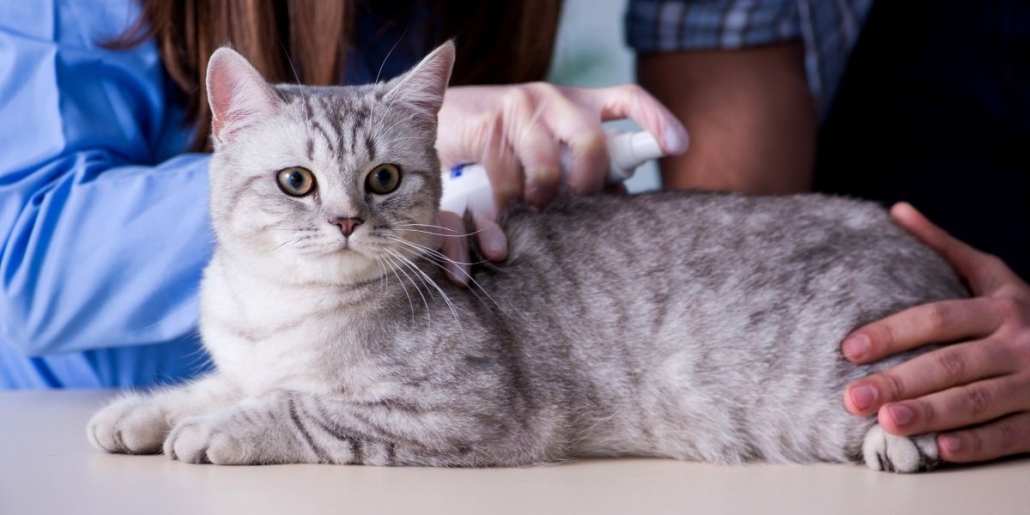External deworming of cats – when and how is it done?
External deworming in cats is just as essential as internal deworming for protecting your pet from external parasites. Everyone wants their cat to be active, playful, and of course, healthy. Periodic external deworming is essential to reduce the risk of our cat being exposed to a hypersensitivity reaction to the parasite’s sting. We can avoid visits to the veterinarian if we perform regular external deworming. Thus, in today’s article, we will show you how to do external deworming in cats and when necessary.
The main external parasites in cats
The external parasites that we can encounter in our cats are also called ectoparasites. The main external parasites are ticks, fleas, and mites.
Ticks in cats
Ticks in cats are less common than in dogs. These external parasites are more common in the warmer months, especially in green areas. However, with climate change, ticks are found for a more extended period throughout the year.
Ticks are external parasites that feed on the blood of the host body and can transmit dangerous diseases caused by viruses, bacteria, protozoa. It has been found that these external parasites affect dogs more than cats, but cats can also be exposed to certain diseases caused by ticks.
Piroplasmosis or babesiosis in cats is an infectious disease caused by ticks of the genus Babesia (piroplasms). This type of tick bites the cat. A wound is formed on the pet’s body through which Babesia enters its body. Through this bite, various harmful microorganisms will reproduce inside the cells, and there will be a general intoxication that will lead to the mass destruction of red blood cells. Babesiosis in cats can be as dangerous as in dogs if not treated in time or prevented. With this disease, the cat may experience an accelerated inflammatory process that can cause limb paralysis or even death of the animal.
Fleas in cats
Fleas are the primary external parasites that are found in cats and dogs. Fleas multiply rapidly so that in just 12 months, they can produce millions of chicks. Fleas are external parasites that feed on the blood of the parasitized animal. Cats can get fleas from another cat very quickly.
Because of fleas, cats can suffer from:
– Strong and painful itching due to excessive scratching
– Allergic dermatitis – is a common and uncomfortable skin condition that is caused by flea saliva. This hypersensitivity to flea bites is considered one of the most common skin diseases that pets can have.
– Anemia in cats – this condition occurs in cats when the number of pests is very high. Frequent flea bites can lead to severe complications and can lead to the death of your pet.
– Bartonellosis – this disease that cats can contract is caused by flea feces that these external parasites leave on the body of the pet. Due to contact with flea feces, cats can develop several diseases. Cats can have mouth and gum damage, inflammation in the eyes and heart disease. It is important to note that this condition can be easily transmitted to other cats and humans. This way, you need to avoid scratching a cat affected by bartonellosis, as it can seriously damage your health.
Mites in cats
Mites in cats are external parasites that can be of two types:
– Ear mites (causes ear irritation)
– Sarcoptic mites (affects cats regardless of age, breed, or season)
Fleas or ticks are easily detected by cat fur, but a specialist can only see mites.
Symptoms caused by external parasites in cats
The symptoms caused by external parasites in cats are diverse and can be easily observed by the pet owner. Thus, if your cat suffers from anemia, you will notice:
– A weak body
– A state of lethargy
– Fast breathing
In case of hypersensitivity to a flea bite, the cat will have the following symptoms:
– Severe itching
– Frequent scratches
– Hair loss in some regions of the body
External deworming in cats – how to do it
External deworming in cats is essential for your pet to have a healthy and active life. Choosing the right product for external deworming on your cat is crucial, as your pet may have allergies to various substances. You can use:
– antiparasitic pipettes – applied to the cat’s skin, in the neck area. The efficiency is up to four weeks
– antiparasitic collars – are one of the most used and valuable solutions to keep external parasites at bay.
– Antiparasitic shampoos – are effective in soothing the cat’s skin in case of irritation caused by flea bites, but the shampoos will not remove the eggs from external parasites
– Antiparasitic powder – is the perfect solution for removing external parasites if the cat does not like water. This powder is applied to the fur and skin of the pet.
It is straightforward to tell if our cat has fleas. We will notice that our pet will often scratch or over-toilet.
External deworming in cats should be performed regularly. Otherwise, fleas will become a real challenge. Fleas can lay up to 50 eggs a day. It is essential that when you notice fleas on your cat, you should also use products to disinfect the environment and those used for external deworming of the animal.
External deworming should be done in winter, not only in warm seasons. Kittens (7-8 weeks) are protected from antibodies by the mother. After this age, the veterinarian will determine the vaccination schedule. Even if your cat lives longer in the house, it can be exposed to external parasites.
On the Biotur Shop platform, you will find products recommended for the external deworming of your cat and much more.



